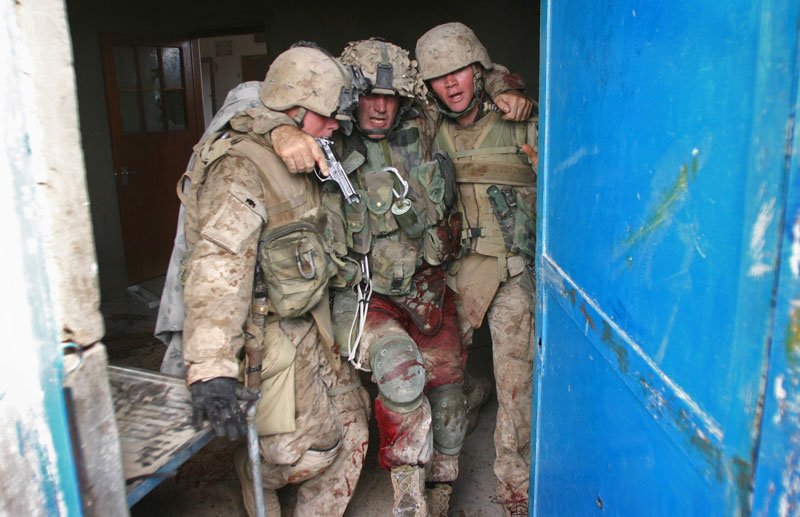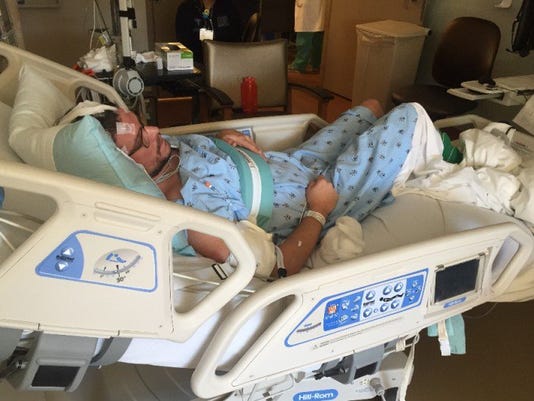
Below is the link to his go fund me page.
Support U.S. Marine Chris Marquez!
A former Marine became the target of an alleged assault in McDonald’s on Friday, February 12, 2016, as a crowd of youths cornered him and demanded he answer the question, “do you believe black lives matter?” Before knocking him unconscious and robbing him.
Christopher Marquez, a veteran of Iraq and recipient of the Bronze Star for valor, said he was dining at a McDonald’s in northwest D.C. when a group of black teenagers came up to him and allegedly began harassing him about the black lives matter movement. Marquez ignored them which prompted calls and shouts that he was a racist.
Marquez left the establishment after eating, but allegedly sustained a sudden blow to the back of his head outside the McDonald’s, which knocked him unconscious. When he woke up, his pants were ripped and wallet gone, which contained $400 in cash, three credit cards, his VA medical card, school identification, metro card and driver’s license.
“I remember this group of teens harassing me while I was eating, they surrounded my table and kept on asking me ‘Do you believe black lives matter,'” Marquez told The Daily Caller News Foundation. “Then they started calling me a racist. I can’t recall if they were saying anything else to me at this moment because the blow to my head really screwed up my memory.”
DeAnthony Mason, manager of the McDonald’s, reviewed security footage and told Marquez in a phone call Saturday that when he left the restaurant a teen with a white shirt struck him on the side of the head, knocking him unconscious. The other teens then converged on his incapacitated body, taking his belongings. The head blow Marquez sustained left his memory dazed, but Mason’s review of security footage helped him piece together what occurred.
Upon regaining consciousness, Marquez found a cab driver willing to drive him to his apartment across from American University, where he attends school. Workers in the lobby called the police on his behalf, who took him to George Washington Hospital where he was evaluated for several hours. Medical documents obtained by The DCNF show Marquez was treated for head trauma and an eye contusion.
Credit card transactions reviewed by The DCNF reveal that the assailants charged over $115 on his various credit cards at a liquor store, Five Guys and Walmart. Mason, the McDonald’s store manager told Marquez that police have been looking for the group of teens for a previous incident.
“I believe this was a hate crime and I was targeted because of my skin color,” Marquez told The DCNF. “Too many of these types of attacks have been happening against white people by members of the black community and the majority of the main stream media refuses to report on it.”
Marquez served eight years active duty in the Marines between 2003 and 2011 in Iraq and Afghanistan as a Rifleman and Scout Sniper. He received the Bronze Star for valor during his first deployment after he carried the body of his slain team leader from combat following an ambush during the Battle of Fallujah.
“When I was in the Marine Corps, I served with people from many different backgrounds, ethnicities, religions, and races,” Marquez told The DCNF. “Like all Marines, I fought for the freedom of all Americans and not just one particular group.”
Marquez was also involved in the infamous fire fight dubbed “Hell House” in Fallujah. He and a fellow Marine, Dane Shaffer, pulled out four Marines who were stuck in a house after an insurgent ambush. A picture taken of them pulling Sgt Maj Brad Kasal out of battle served as the inspiration for a famous war memorial of Iraq located in California, reports The Los Angeles Times. Marquez is pictured on the left side holding Kasal by his right arm.
Officer Anthony Hector of the Metropolitan Police Department is currently investigating the alleged assault. The DCNF reached out to the MPD for comment but no further details could be provided at this time. Marquez described roughly 5 black assailants including one female, ages 16 to 21.
Marquez told The DCNF, “I really think this group of teens is dangerous and will do this type of thing again if they are not caught.”
So, my name is Danny Amoruccio, a retired funeral director in Southwest Connecticut who had the honor of serving veterans who have passed before us. I also come from a family who proudly served in the U.S. Army & Navy.
I find this to be an outrage and absolute disgusting situation our country is facing today. And it needs to stop! My heart went out to him and the least we can do as Americans is help him, as he helped to keep the U.S. safe. Why not raise $400.00 that was stolen by these thugs? The credit card charges will undoubtebly be reversed, so I'm not asking for a million dollars here!
The monies raised here will undoubtebly be given directly to Mr. Marquez in PERSON, as I will hand him the check. It will be broadcasted for all to see, to ensure this is NOT a scam.
1. Who you are: Daniel J. Amoruccio
2. Where you're from: East Norwalk, Connecticut
3. Your relationship to the parties you're raising funds for: No relation what-so-ever. Just a good American helping another!
4. How the funds will be spent (be specific as possible): That will be up to the beneficiary, Chris Marquez who will receive the funds directly from me - or he can withdraw them directly from the gofundme account.
5. How you intend to get the funds to those in need: I live right on the rail line in SW Connecticut! I am an Executive Member Card Holder with Amtrak and have free tickets at my disposal. I plan on hopping the train and take 4 hour trainride and meet Mr. Marquez in person and present him the check if need be! I have my own money, this is all for him!
Christopher Marquez, a veteran of Iraq and recipient of the Bronze Star for valor, said he was dining at a McDonald’s in northwest D.C. when a group of black teenagers came up to him and allegedly began harassing him about the black lives matter movement. Marquez ignored them which prompted calls and shouts that he was a racist.
Marquez left the establishment after eating, but allegedly sustained a sudden blow to the back of his head outside the McDonald’s, which knocked him unconscious. When he woke up, his pants were ripped and wallet gone, which contained $400 in cash, three credit cards, his VA medical card, school identification, metro card and driver’s license.
“I remember this group of teens harassing me while I was eating, they surrounded my table and kept on asking me ‘Do you believe black lives matter,'” Marquez told The Daily Caller News Foundation. “Then they started calling me a racist. I can’t recall if they were saying anything else to me at this moment because the blow to my head really screwed up my memory.”
DeAnthony Mason, manager of the McDonald’s, reviewed security footage and told Marquez in a phone call Saturday that when he left the restaurant a teen with a white shirt struck him on the side of the head, knocking him unconscious. The other teens then converged on his incapacitated body, taking his belongings. The head blow Marquez sustained left his memory dazed, but Mason’s review of security footage helped him piece together what occurred.
Upon regaining consciousness, Marquez found a cab driver willing to drive him to his apartment across from American University, where he attends school. Workers in the lobby called the police on his behalf, who took him to George Washington Hospital where he was evaluated for several hours. Medical documents obtained by The DCNF show Marquez was treated for head trauma and an eye contusion.
Credit card transactions reviewed by The DCNF reveal that the assailants charged over $115 on his various credit cards at a liquor store, Five Guys and Walmart. Mason, the McDonald’s store manager told Marquez that police have been looking for the group of teens for a previous incident.
“I believe this was a hate crime and I was targeted because of my skin color,” Marquez told The DCNF. “Too many of these types of attacks have been happening against white people by members of the black community and the majority of the main stream media refuses to report on it.”
Marquez served eight years active duty in the Marines between 2003 and 2011 in Iraq and Afghanistan as a Rifleman and Scout Sniper. He received the Bronze Star for valor during his first deployment after he carried the body of his slain team leader from combat following an ambush during the Battle of Fallujah.
“When I was in the Marine Corps, I served with people from many different backgrounds, ethnicities, religions, and races,” Marquez told The DCNF. “Like all Marines, I fought for the freedom of all Americans and not just one particular group.”
Marquez was also involved in the infamous fire fight dubbed “Hell House” in Fallujah. He and a fellow Marine, Dane Shaffer, pulled out four Marines who were stuck in a house after an insurgent ambush. A picture taken of them pulling Sgt Maj Brad Kasal out of battle served as the inspiration for a famous war memorial of Iraq located in California, reports The Los Angeles Times. Marquez is pictured on the left side holding Kasal by his right arm.
Officer Anthony Hector of the Metropolitan Police Department is currently investigating the alleged assault. The DCNF reached out to the MPD for comment but no further details could be provided at this time. Marquez described roughly 5 black assailants including one female, ages 16 to 21.
Marquez told The DCNF, “I really think this group of teens is dangerous and will do this type of thing again if they are not caught.”
So, my name is Danny Amoruccio, a retired funeral director in Southwest Connecticut who had the honor of serving veterans who have passed before us. I also come from a family who proudly served in the U.S. Army & Navy.
I find this to be an outrage and absolute disgusting situation our country is facing today. And it needs to stop! My heart went out to him and the least we can do as Americans is help him, as he helped to keep the U.S. safe. Why not raise $400.00 that was stolen by these thugs? The credit card charges will undoubtebly be reversed, so I'm not asking for a million dollars here!
The monies raised here will undoubtebly be given directly to Mr. Marquez in PERSON, as I will hand him the check. It will be broadcasted for all to see, to ensure this is NOT a scam.
1. Who you are: Daniel J. Amoruccio
2. Where you're from: East Norwalk, Connecticut
3. Your relationship to the parties you're raising funds for: No relation what-so-ever. Just a good American helping another!
4. How the funds will be spent (be specific as possible): That will be up to the beneficiary, Chris Marquez who will receive the funds directly from me - or he can withdraw them directly from the gofundme account.
5. How you intend to get the funds to those in need: I live right on the rail line in SW Connecticut! I am an Executive Member Card Holder with Amtrak and have free tickets at my disposal. I plan on hopping the train and take 4 hour trainride and meet Mr. Marquez in person and present him the check if need be! I have my own money, this is all for him!













































